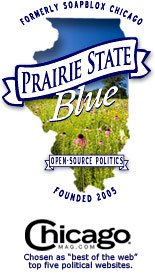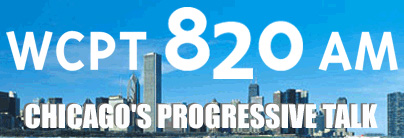Q: What are the issues in Illinois? A: The first is the long-term, structural loss of jobs in the state, that fact that the jobs we’re losing are the $25-an-hour jobs and the ones that are being created are $7- and $8-an-hour jobs. That’s something the people are very concerned about. I think they’re very concerned about the ever-escalating price of health care — not just people who don’t have health insurance, but people who do but who’ve seen their premiums and deductibles go up repeatedly and small businesses that are having trouble getting health insurance for their workers.Be sure to read the whole interview.
***
Q: As you’ve traveled around the state, what has most surprised you most about Illinois — particularly since you’re fighting the stereotype of being a Chicago Democrat? A: I’m struck by how decent people are all around this state. The Midwestern values that I grew up on continue to thrive in communities all across the state: hard work, decency, common sense, the fact that people are suspicious of ideology or absolutism and much more interested in solving problems.
***
Q: For the better part of the past two years, the Republican spin machine has been intent on painting you as left-winger. How do you respond to that sort of absolutism? A: The problem is that they make these assertions, but when you press them on specifics, it is a pretty thin gruel that they are offering up.
***
Q: When you speak in General Assembly debate, you seem to emphasize the points Republicans and Democrats have in common on an issue. Is that by design? A: That’s how politics should work. I’m not in politics just to score points or make other people look bad or to diminish them in some fashion. What I’m interested in is lifting up people and creating a climate where we can work together to solve our common problems.
***
Q: Who are your political heroes? A: We all have personal heroes … my mother and some other people I have known in my life. I guess publicly it would be Lincoln, Gandhi, King. I’m a huge admirer of political leaders who transform the debate. They don’t just take the debate as it exists and work that, but rather they create a whole new language and a whole new way of thinking about our obligations to each other and our ideals.
Sunday, September 05, 2004
"People are suspicious of ideology or absolutism and much more interested in solving problems."
The staff of the QUAD-CITY TIMES Springfield Bureau recently sat down with Barack Obama for an exclusive “One-on-One” interview. Here are some fair-use abusing exerpts:
Subscribe to:
Post Comments (Atom)
Followers
Blog Archive
-
▼
2004
(398)
-
▼
September
(77)
- Daily Show LIVE!
- Post Debate Analysis
- I always wondered what happened to the League of W...
- Cowboys don't go to Andover, Yale and Harvard Busi...
- Play "Who said it?"
- I'm "sleazy and unreliable" and you probably are too.
- Obama's trip to the City of Brotherly Love
- "This guy is great, let's hope he'll stick around."
- Oil Prices Reach Record Level
- IL-GOP folds up the Big Tent
- Lesbian parents and parents of lesbian
- Illinois gets the short end of the stick
- Iraq v. The War Against Terror
- Iraq round-up
- Daschle leads in South Dakota
- But what about his deep roots in Calumet City?
- Distinguishing between the Senate candidates
- Lynn Sweet's error exposed!
- Keyes hometown paper examines his campaign
- Barack Obama's Advice for John Kerry
- Musharraf backs Obama
- Senate Candidates on Immigration
- Ballpoint pens also defeat laptop locks
- The Coalition of the States of America
- IL-GOP assessed in Candorville
- An examination of Alan Keyes' broad support in the...
- Michelle Obama has broiled salmon
- Dick Cheney is sitting in a room and off in a corn...
- You think?
- Obama on Iraq
- Obama blames job losses during the Bush administra...
- GWB TCB 4 UBL
- Oh *that* "back-door draft"
- Ride in style from Chicago to Milwaukee for swing ...
- When the Illinois GOP gives you lemons...
- The Bush Recovery in action
- A short message to the Undecideds
- Kitty Kelley's naughty naughty book
- The golden touch of Dave Syverson
- So-called "Jersey Girls" endorse Kerry
- The City of Big [Brother Looking Over Your] Should...
- ROAD TRIP!
- George W. Bush: Fortunate Son
- Alan Keyes: Obama voters aren't true Christians
- Neilwatch
- Tribune mistakenly puts $301K into news carrier's ...
- IL-GOP: Alan Keyes can speak in English
- Secret Service hassles reporters during heckling a...
- Going once... Going twice...
- The City of Big [Brother Looking Over Your] Shoulders
- Overlooked while the Swift Boat lies were being co...
- Where Was W When?
- I guess they found the telephone.
- Unbelievable
- An Alan Keyes Two-fer
- It's not a speech until it's spoken and it's not a...
- Anything but Grand
- Remember the good old days when the Saudi royal fa...
- "W stands for wrong. Wrong choices. Wrong direction."
- Bloodiest Month for U.S. Troops in Iraq
- Stating the Obvious, Parts I and II
- "People are suspicious of ideology or absolutism a...
- "It starts right here, it starts right now, and it...
- "If you want to be first, you have to be first in ...
- Alan Keyes: Far-Right Drag Queen?
- Big Jim: Obama looks moderate
- Keyes defends Illinois from the threat of adequate...
- George W. Bush: Words Speak Louder Than Actions
- Admit it, you were thinking it too...
- Baby Talk
- Maybe it means John Ashcroft doesn't respect reading
- Has Kerry been playing "Rope-a-Dope"?
- Get Your Republican National Convention On
- I'll bet he doesn't think much of those teens in t...
- Denny Hastert and Lyndon H. LaRouche
- Michelle Obama profile
- Staying on Message
-
▼
September
(77)










No comments:
Post a Comment